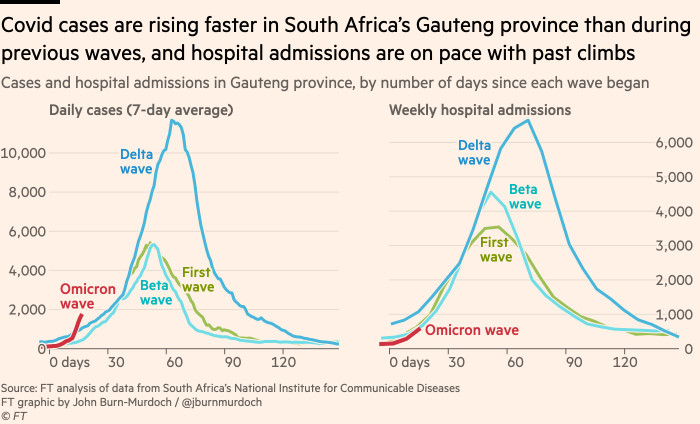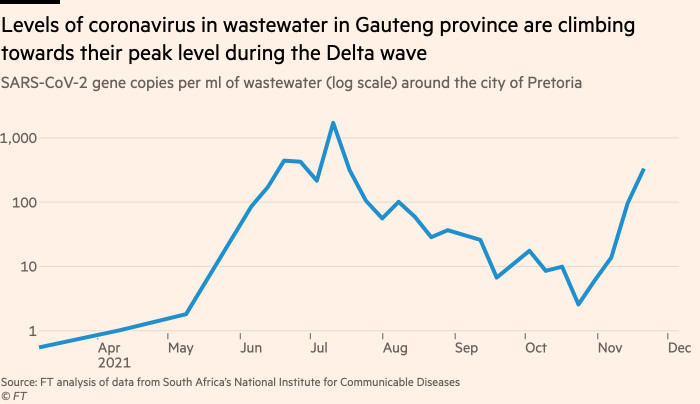Health officials worldwide are closely following the fast-rising wave of coronavirus infections in South Africa for clues to explain the heavily mutated Omicron variant.
While the strain has been detected in countries ranging from the UK to Canada and Hong Kong, it is South Africa and its neighbours where the outbreak was first detected that they are looking to for much-needed data on the new variant.
“The world is watching South Africa,” said Deenan Pillay, professor of virology at University College London.
Of particular concern is that the highly unusual 50 mutations to the virus might enable Omicron to spread faster, while also helping it to evade the immune protection provided by vaccines and prior infection. Others have debated the severity of symptoms related to the new strain.
South Africa’s infections have jumped in recent days, driven by a surge in cases in Gauteng province, which includes Johannesburg and Tshwane. Covid-19 cases have more than tripled in the past week, from below 4,000 in the seven days to November 21 to 13,828 the following week, according to data from South Africa’s National Institute for Communicable Diseases (NICD).

Most of those have been tied to Omicron, which thanks to a genetic quirk can be picked up from regular PCR testing without the need for genomic sequencing.
But experts insisted more real-world data was needed on transmissibility, adding there was also no confirmed evidence yet on its severity despite anecdotal reports over the weekend that Omicron produced milder disease symptoms.
“There’s a lot of things we think we know about Omicron . . . South Africa will be the first place we can test some of our hypotheses,” Pillay added.
Few doubt new infections will continue to rise. By analysing samples from a wastewater treatment facility in Gauteng, researchers have been able to show that by the middle of this month, traces of the virus detected had almost reached the levels found in the run-up to the Delta wave’s peak in July.

Salim Abdool Kalim, an epidemiologist and former head of South Africa’s ministerial advisory committee on Covid-19, said: “We’re going to get more cases quickly, and we’re already seeing early evidence of this.”
He predicted that whatever the virulence of the strain, South Africa would “see pressure on hospitals in the next two weeks”. Covid-related hospital admissions have already doubled in a week, to 580 in the seven days to November 28, according to NICD.
At the same time, immunity is thought to be at a very high level in South Africa, with the large majority of the population estimated to have been infected with Covid-19 since the pandemic began, based on excess death figures, as well as 29 per cent of the population having had at least one vaccine dose.

Tom Wenseleers, professor of evolutionary biology at the University of Leuven, predicted that Omicron’s R0, the basic reproduction number in a population with no immunity and no containment measures, was “in the ballpark” of the Delta variant, at between 6 and 7.
But he suggested that Omicron’s mutations gave it “added strength” that would allow it to “outcompete” Delta. “We can tell from the genetics of the virus and the fast spread in South Africa that Omicron will pose a problem to every country,” he said.
Despite the increase in hospital admissions, some medics working on the ground expressed hope that Omicron might result in less severe disease.
“It doesn’t look at the moment as if there’s any signal towards increased severity, but it’s early. [In fact], the proportion of patients admitted with severe disease are quite low, and lower than what we’ve seen across the rest of the pandemic,” said Waasila Jassat, a doctor and NICD specialist, adding that the vast majority of admissions had not been vaccinated.
Elsewhere in South Africa’s health system, “it’s still early days for us as general practitioners”, Unben Pillay, a private practice doctor in Gauteng, said, while noting that he had detected a “very sharp increase” in cases in the past 10 days, often with mild flu-like symptoms.
David Stuart, professor of structural biology at Oxford university, said, in the best-case scenario: “What we’re all hoping for is that because there are so many changes to the virus, and those changes will almost certainly affect the affinity with [receptors in the human body], that Omicron may cause somewhat less severe disease.”
Other experts urged caution on placing too much faith in estimating Omicron’s severity before extensive research into the new strain had been completed. “Anecdotes don’t raise any red flags just yet, although we don’t know for sure,” said Abdool Karim.
UCL’s Pillay also cautioned against reading too much into reports of mild symptoms because of South Africa’s young population and because some early outbreaks centred on universities in Pretoria.
Meanwhile, those scientists investigating the new variant are grateful for South Africa’s transparency and scientific expertise.
“They are ahead of us on the epidemic curve and we will learn a lot from what is happening there,” said Stuart.
“South Africa was extremely open and made all the information [on Omicron] available to the global community in a very timely way. For that, we should be immensely grateful,” he added.
Additional reporting by Donato Paolo Mancini in London
‘The world is watching South Africa’: health experts sift Omicron clues
Pinoy Variant